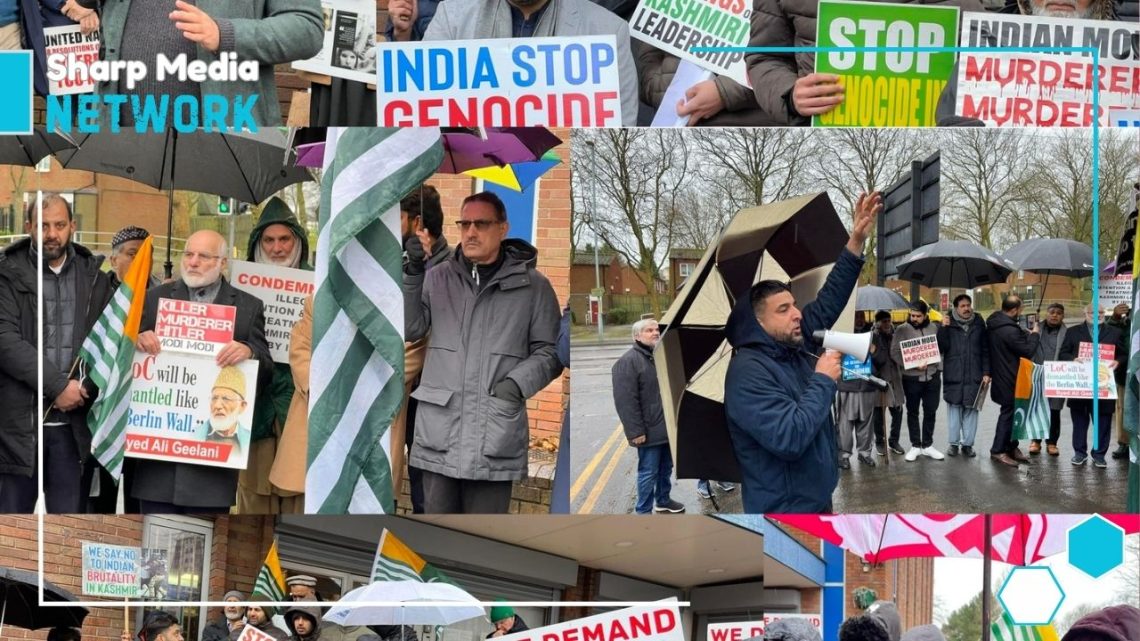
Kashmiris in UK Observe India’s Republic Day as a “Black Day” in Protest
January 27, 2025As India celebrated its Republic Day, British Kashmiris took to the streets of Birmingham to mark the occasion as a “Black Day,” renewing their call for an end to India’s occupation of IIOJK and highlighting the ongoing struggle for justice.
On India’s Republic Day, a large group of British Kashmiris gathered outside the Indian Consulate in Birmingham to protest against India’s continued occupation of Indian Illegally Occupied Jammu and Kashmir (IIOJK). Demonstrators carried flags and placards with pro-freedom and anti-India slogans, condemning the ongoing oppression in the region. The protest served as a powerful reminder of the global struggle for the rights of Kashmiris and their demand for self-determination.
The protest was organized and led by Fahim Kayani, President of the All Parties International Kashmir Coordination Committee (APIKCC). He was joined by prominent figures such as Inamul Haq, Secretary General of APIKCC; Muhammad Ghalib, President of Tehreek-e-Kashmir (TeK) Europe; and several other activists including Mufti Fazal Ahmed Qadari and Shakeel Chaudhry.
Speakers at the protest emphasized that Kashmiris worldwide observe India’s Republic Day as a “Black Day” to highlight their ongoing struggle for freedom and justice. They condemned India’s actions in IIOJK, calling the country a “terrorist state” responsible for gross human rights abuses in the region.
Fahim Kayani, a key spokesperson at the rally, passionately reiterated that Kashmiris would not relent in their fight for self-determination, as guaranteed by United Nations resolutions. He lambasted India for depriving Kashmiris of their basic rights, asserting that India’s claims of being the world’s largest democracy were nothing but a façade, masking its hypocrisy and double standards.
Kayani also took a strong stand against Indian Prime Minister Narendra Modi’s government, denouncing the Hindutva ideology and the oppressive actions of the Indian military in IIOJK. He emphasized that despite India’s efforts, the Kashmiri resistance remained resilient, and their demand for freedom would continue until the occupation was brought to an end.
Additionally, Kayani called on the international community to impose sanctions on India for its ongoing violations of UN resolutions, international law, and the Fourth Geneva Convention. He argued that India’s disregard for these legal frameworks made it one of the world’s worst violators of human rights.
Inamul Haq, Secretary General of APIKCC, condemned India’s celebration of Republic Day, stating, “A nation that denies Kashmiris their fundamental rights has no moral authority to celebrate its Republic Day.” Haq’s words reflected the sentiments of many in the protest, who argued that India’s actions in Kashmir made its Republic Day celebrations a mockery of democracy.
Muhammad Ghalib, President of Tehreek-e-Kashmir Europe, also voiced strong criticism of India’s celebrations, highlighting the suffering caused by decades of violence in IIOJK. He stated, “India has perpetuated death and destruction in IIOJK for decades. It has no right to celebrate Republic Day while oppressing millions.”
While protests in Birmingham captured attention, similar demonstrations took place in other cities, including Paris, where members of the Kashmiri and Pakistani communities rallied against India’s unfulfilled promises to grant Kashmiris their right to self-determination. Protestors in both cities vowed to continue their efforts until Kashmiris were granted the right to vote on their future, underscoring their determination to maintain the global campaign for justice and freedom in the region.
The protests in Birmingham and other parts of the world reflect the ongoing global mobilization for Kashmir’s right to self-determination. Despite India’s celebration of Republic Day, Kashmiris and their supporters remain resolute in their demand for justice, human rights, and an end to the occupation. The international community’s role in addressing the Kashmir issue continues to be a critical factor in the pursuit of lasting peace and resolution.

